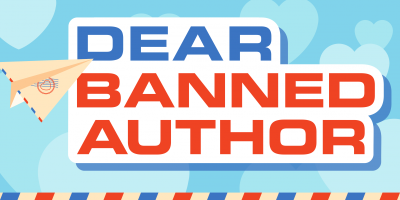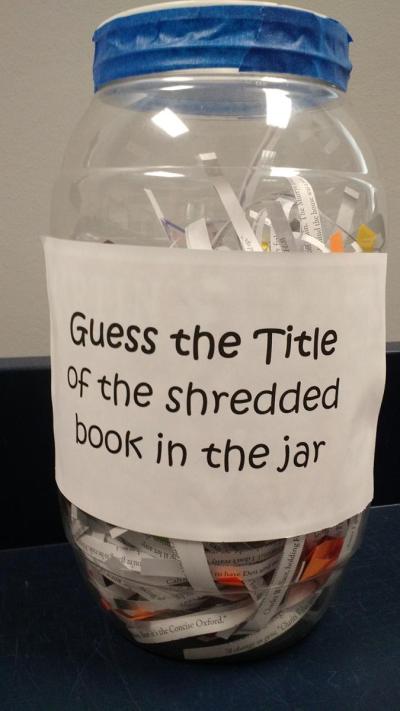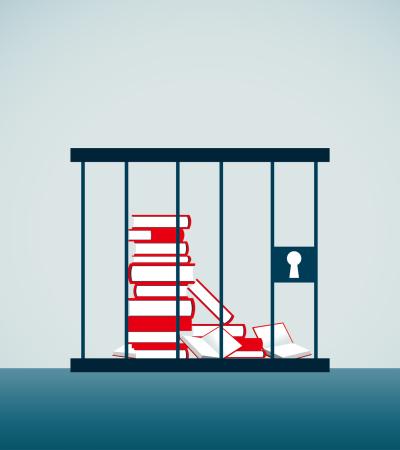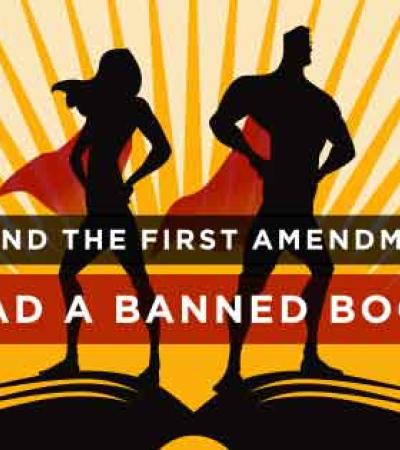In September teens have busy schedules, and I want our public library to offer a relaxing break and meaningful creative outlets. However, I also strive to design programs where teens can grapple with the topics they are passionate about. Top on the list of pressing concerns is freedom of expression.
By participating in Banned Books Week, we have an opportunity to connect with a larger body of people who are concerned about freedom of expression and the right to read. This year Banned Books Week will be an inspiring starting point for a year of creative civic engagement in my youth programs.

Dear Banned Author
Throughout September our teen books display will highlight banned and challenged authors, and our activity table will feature the Dear Banned Author resources from ALA's Office for Intellectual Freedom website. This letter-writing campaign encourages readers to connect with favorite authors and share what their work has meant to them.
We printed postcards on stock, provided a list of author addresses, and set out writing instruments. Postcards will be stamped by circulation desk staff.
Guess the Book
We also have a Guess the Book jar, which contains copied and shredded pages from a frequently challenged title. (I prominently label the jar, “No books were harmed in the making of this contest.”)
Last year the book jar prompted a number of conversations among browsers, and it also inspired research. One teen would ask, “Could it be X?” and another teen would respond, “Has that been challenged? Why would that be challenged?” It is a simple but engaging activity.

Respond with creativity: Buttons & t-shirts
During Banned Books Week we will have a Keep the Light On evening program where high school students can discuss banned and challenged books and create art in response. An art response is a very flexible option, accommodating a wide range of skill levels and media.
We invested in a button maker because they are very popular in our community, fun to make and suitable for many different programs. Before I made that purchase we made buttons with cardboard, masking tape and safety pins. They were also awesome.
A button might have the phrase "Keep the Light On," "I read banned books," a quote from a favorite books or detailed artwork. If there are blank stickers of any kind in the supply closet, they are fun to work with also. School folders and notebooks can be greatly improved with handmade stickers.
I anticipate that our button maker will be the most popular art tool, but I also have a stash of white t-shirts to decorate with paint pens. Your library might invite participants to bring an old shirt to redesign. Plans include putting out a poster board for art responses that can be hung in the teen area after the event. This can be a simple but powerful collective art project.
Keep it going with civic engagement
We will carry the energy of engaged discussion into October when our Teen Debate Club launches. This will be a Friday after-hours program suggested by a couple of regular library attenders. One is a participant in the school youth and government program and has fun with debate practice. Another felt shy to debate in a large group but really enjoys learning about socio-political issues.
I consulted with a model government adviser and obtained rules for basic parliamentary procedure. It will be interesting to see whether this becomes simply a fun forum or if it can inspire and launch activism. Whichever direction the teens travel, I hope I can support their goals.
Even if you are not hosting an ongoing debate club, staging a debate (formal or informal) provides a powerful tool for discussing the reasons that books get challenged and provides teens an opportunity to discuss, articulate and perhaps broaden their views.
Give voice through film
Another event planned for my library calendar will be preparing for the National Coalition Against Censorship Youth Free Expression Film Contest. Submissions will be open March to mid-April. I intend to use some of the winners and semi-finalists as prompts for Debate Club. This year’s contest on the theme Truth to Power included short films addressing gun violence, sexual assault, displancement and migration, climate and gender equality.
Enabling and supporting free expression lies at the core of library work. With Banned Books Week, libraries can welcome the new school year with creative and thought-provoking programs.


